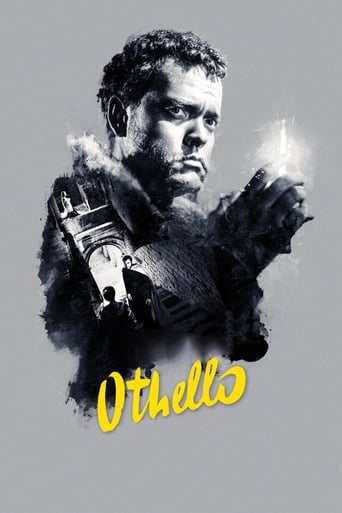bigverybadtom
The movie starts with the scene after the events of the story. Without dialogue, we see the doomed Othello and Desdemona in a funeral procession, while Iago is placed in a suspended cage as punishment for his crimes. A powerful scene-but unfortunately the depiction of the story fails.The fatal error was the fact that while the dark visuals are impressive, I found the dialogue literally impossible to understand, let alone follow. This made the story genuinely impossible to follow- and the story did not even seem to much follow the original Shakespeare play. I cannot comment on how the original film might have been, but the restoration is a failure.
Robert J. Maxwell
I'd heard so much about the troubles Orson Welles had in getting this movie finished that I was loathe to watch the thing, expecting something resembling a pretentious home movie. It took years. Actors came and went. The location shooting in Venice was done without sound and had to be dubbed later. The leading lady, Suzanne Cloutier, was French Canadian and needed to be dubbed. The important role of Cassio was dubbed by Welles himself, the actor not being available at the time. There were untimely interruptions, problems with money.But what came out of it all is pretty easy to admire. It's not "Citizen Kane." It was assembled out of edited bits and pieces of different takes. The longest shot lasts about one and a half minutes. It's impressive nonetheless -- a black and white epic full of strange shadows, facades like the elaborate white frosting on a wedding cake, astounding compositions, and performances that hit the spot. And, after all, this is Shakespeare. He wrote a couple of clunkers, true, but everyone who has ever said that jealousy is "a green eyed monster" is quoting from Othello.As the story goes, Othello is The Man on Cyprus, and a black man, who takes Desdemona for his wife. His friend, Iago, for no particular reason, manages to convince Othello that Desdemona had been unfaithful. Othello's rage leads him to strangle her and then kill himself. Iago has a satisfying explanation for his machinations. His first line is, "I do hate the Moor." And later, "I am not what I am." Or, as the Bard put it elsewhere, "Most friendship is feigning, most loving mere folly." The ending is a little weak. It amounts to pulling Iago into the bedroom with the two dead bodies and scolding him, as in, "Aren't you ashamed of yourself." To give Iago credit, he does seem a little put out, at least in the play.Welles does Othello in blackface but the technology isn't what it would become. The dark make up shines whenever there's light around, giving the impression that Othello is constantly covered by a nice, even sheen of sweat. At least he doesn't jabber on in a Jamaican accent like Lawrence Olivier. Micheál MacLiammóir as Iago does a fine job. He doesn't look exactly evil. He looks like the kind of guy that would overcharge you a little if he fixed your computer. There is a striking action scene involving two men, one of them drunk, struggling in an ornate sewer. As Desdemona, Cloutier doesn't really have much to do but she certainly looks the part of the fragile, vulnerable, loving Renaissance wife, the kind of role Joan Fontaine would have handled expertly ten years earlier.
Ensign_Ricky
This may actually be one of the worst productions of Othello I have ever seen. Cuts are made left and right to the original script to the point where not only is Iago's entire motive for his actions lost, but the character of Desdemona may as well have been played by an inflatable sex doll for all the impact she has on the production. I don't know how much of this to blame on Welles (I couldn't help but notice all of HIS monologues were pretty much intact, while poor, honest Iago's either lie on the cutting room floor or were never filmed to begin with), or the editor of the film. Whichever is responsible should have been ashamed of themselves for turning out this slap in the face to Shakespeare.
MisterWhiplash
I don't know if Orson Welles' Othello will be the best adaptation of Othello - from what little I could bare to watch it's certainly superior than the turgid and offensive Laurence Olivier version, though perhaps not quite as well acted as the Branuagh - but it would be hard pressed to see another that was as great a *film* as this is. This is not simply a case of 'well, he did the best that he could work with'. While there is an element of this, as it is true that Welles made a real "indie" movie by financing the project himself over three years and had to make do with getting the footage he could and the actors he could (one of which wasn't there for the dubbing, Rodrigo), it is on its own terms a revolutionary form of Shakespeare because it eschews the static nature of a stage. For Welles, film should be alive and move one to see the world through his eyes, and it's through this that Othello, the always haunting story of a Moor's doubt of infidelity with his wife Desdemona by the prodding of Iago, is important.This isn't to say that it's always the easiest to hear (some of the dubbing is lacking in timing), and some of the acting from time to time isn't perfect. Yet its strengths are that of giving us a new way to look at Othello, and at film in general. Sometimes one looks at Shakespeare and it's hard to see it going at a pace that doesn't restrict certain movements of the camera. But Welles' Othello is first, before Shakespeare, an Orson Welles movie. And perhaps more than even The Trial one sees the director crafting this baroque world set in castles of Morocco and Italy with a claustrophobic, maybe even film-noir, sensibility. The eye on these characters is both stark and stilted, as if the high-and-tense emotions of the characters stretch out into the medium itself, like a nightmare inevitably unfolding. And the quick cuts make it move like a post-modern movie; I can't help but think that great films (Breathless, especially in cutting-down an original draft) and not-so great ones (Romeo + Juliet) took heavy influence from this.Knowing the story helps a little, but it's not entirely necessary. Welles delivers his Othello as a figure beguiled by his love, and disillusioned he's often seen in tight close-ups or turned away, ready to explode or perhaps burst into tears at any moment. It's intense work from Welles as an actor, and some of the others like the ones playing Iago and Emilia do deliver all that they can. But while some scenes have been cut, or sometimes whole sub-plots, they don't affect the cores of the characters, and the themes are not hurt by the cuts Welles made to the text. If anything this compacted version is like getting the greatest Cliff-Notes ever, and seen through a filmmaker's eyes that makes us rethink (or just re-asses) how we see this tragedy of Othello through this medium. Does tragedy and consequence, and the horror of a mind scathed by jealousy (or, for that matter, the evil intent of a malicious mind-twister like Iago) gain depth filmed like this? I would think so, by leaps and bounds. If anything, and hopefully this can be a compliment, the film might be a non-silent silent film of Shakespeare, on that level the most profound, as we see a story and conflict unfold all through visuals. Just as one example, watch the scene where Othello is told by Iago firm proof of Desdemona's trysting with Casius (the "With her, on top of her" bit), and then as Othello faints and how the camera spins out of control, seeing the buildings wobble, the world turned upside down, birds flying perpexingly in the air, and people also flipped around contemplating this man Othello, eyes wide open but fixed-frozen like a scarred statue. It's things like this that give Welles' Othello its uniqueness: if you turn on the sound of the voices (sometimes dubbed odd and not totally in sync) one can appreciate the ragged, awesome poetry of one artist channeling another.




